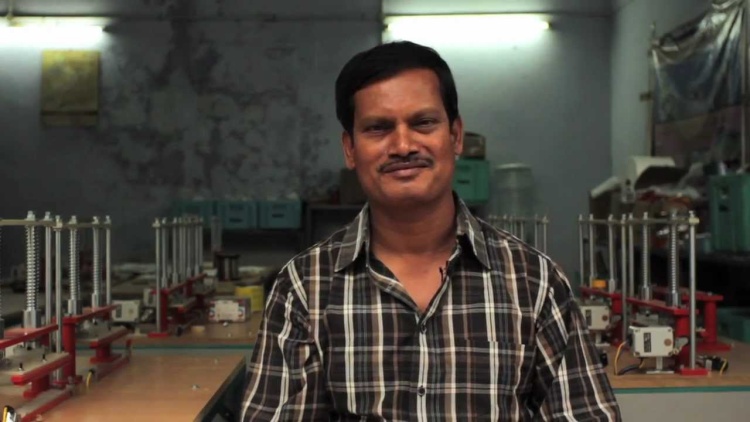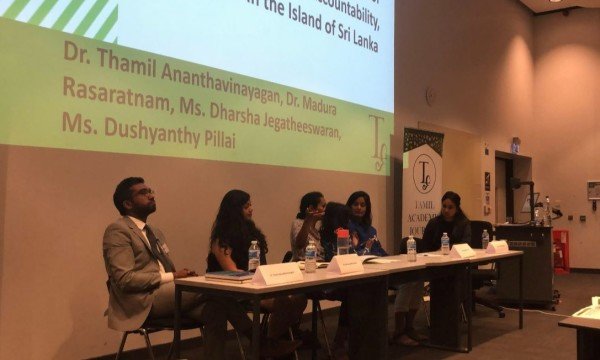
We had originally shared Arunachalam's remarkable story about his struggles to fulfill his dream of empowering rural women across India. There is now a documentary about this remarkable man's journey and how is driving drastic change in India with his revolutionary product and the company that followed.
Read about the "Menstrual Man" documentary at this link.
His original story:
The road to creating the world's first low-cost machine for making sanitary towels begins with a man who wore a sanitary towel himself. In 1998, Arunachalam Muruganantham was a workshop helper who lived below the poverty line in Coimbatore, Tamil Nadu. His research into sanitary towels began when he caught his wife, Shanti, trying to slip away with some filthy rags. When questioned, she said the choice was between buying towels for herself or buying milk for the family.
Her situation isn't unique: 88% of women in India resort to using ashes, newspapers, dried leaves and even husk sand during their periods, according to a report by market research group AC Nielsen called Sanitatary Protection: Every Woman's Health Right. As a result of these unhygienic practices, more than 70% of the women suffer from reproductive tract infections, increasing the risk of contracting associated cancers.
Faced with a challenge, Muruganantham decided to create a low-cost towel for his wife. His entrepreneurial spirit emerged quite early when his father, a handloom weaver, died and Muruganantham had to drop out of high school at 14. His mother earned a tiny amount as a farm worker. To supplement these wages, he began looking for low-cost business opportunities that addressed a need.
Cooking and delivering breakfast to factory workers pressed for time was his first successful venture, but he had to abandon it when he received threats from a competitor who copied his idea. At 15, he joined a workshop where he worked on gates and windows.
Bored by the repetitive designs, he adapted decorative Rangoli patterns to the metalwork and became so popular for his craftsmanship that he started his own workshop. For a child who grew up selling fireworks, sugarcane, lamps and statues of Ganesha, crafting a sanitary towel didn't seem like a big deal.
Advertisement
He started out by purchasing the best quality cotton he could find and made a few samples. Unaware of menstrual cycles, he presented them to his wife and demanded immediate test results. But his wife and sisters refused to discuss his creations with him.
"I was so consumed with research that I'd be up at the crack of dawn, to visit my sisters and ask them about it," he says. When his sisters saw him coming, they'd shout loudly to his wife next door to say that if he was going to ask them about towels, he'd better go back home. Undaunted, he approached female medical students and, when they refused to enter into discussion, gave them feedback forms. Convinced that he was using sanitary towels as an excuse to get close to other women, his wife left him a year and half after he started his research.
With no women willing to discuss Muruganantham's handmade sanitary towels in any depth, he decided to test them himself. Collecting goat's blood from a butcher shop and treating it chemically to prevent coagulation, he wore a bladder-and-tube contraption and women's underwear for a week. His homemade uterus would release a small dose of blood whenever pressed.
Unsatisfactory results prompted him to try another approach. He distributed the towels free and asked women to return the used ones. "It wasn't easy," says Muruganantham. "They thought I would use it for black magic." For his mother, stumbling upon a storeroom full of used sanitary towels was the final straw. She left too.
Muruganantham's breakthrough came at the end of two years of testing different materials. He figured out that towels were made of pine wood cellulose derived from the bark of the tree. He pretended to be a millionaire interested in setting up a manufacturing unit and approached American manufacturers via email with the help of local teachers. The manufacturers sent him board-like sheets that he puzzled over for 10 days until he tore them in half to reveal compressed fibres.
Advertisement
Reclaiming the fibres into usable cellulose, Muruganantham discovered, required a machine costing more than £300,000. "I decided to make a simple version of this machine, to re-engineer it," he says. It took him more than four years of trial and error to fabricate one in his workshop. Two years later, in 2006, his machine won the award for the best innovation for the betterment of society from the Indian Institute of Technology in Chennai. And he was finally able to persuade his family to come back.
Looking at Muruganantham, it isn't immediately apparent that you are meeting a man who endured public ridicule for years, or received a presidential award for innovation. Softly spoken and unassuming, this 46-year-old inventor leaves you howling with laughter as he narrates his tales. The ability to mock himself is one of his chief charms. "Women fled at the sight of me; people used to call me mental and wondered if I had weird diseases," he recalls. "I was even suspected of being possessed by a bad spirit. No one used to come near me during full moons because of that. I had to meet what friends I had in secret."
Passionate about social change, he presents his deeply held convictions without inhibition, which makes him a novelty in the conservative society that surrounds him. He drives his own car, doesn't have a secretary and lives a quiet life – all of which confuses people who are used to seeing more obvious signs of wealth or fame.
Currently more than 600 machines made by his start-up company, Jayaashree Industries, are installed across 23 states in India. In spite of numerous offers, Muruganantham refuses to sell his innovation to the corporate world. "I didn't take the money route because I saw my parents struggle for survival," he explains. "I knew that this machine could provide a sustainable livelihood for many rural women."
His company sells the £1,600 machines directly to rural women with the help of bank loans, as well as through NGOs and women's self-help groups. An operator can learn the entire towel-making process in three hours and then employ three others to help with processing and distribution.

























